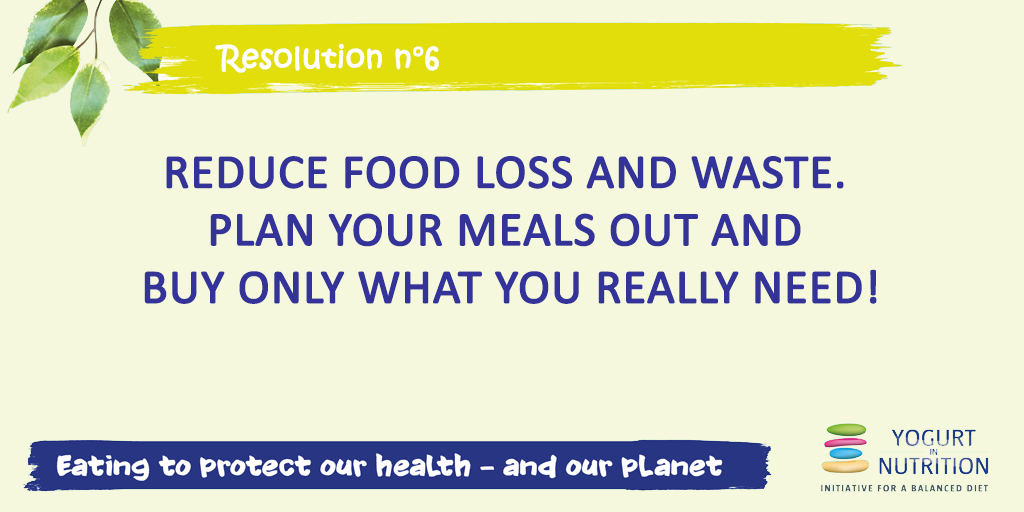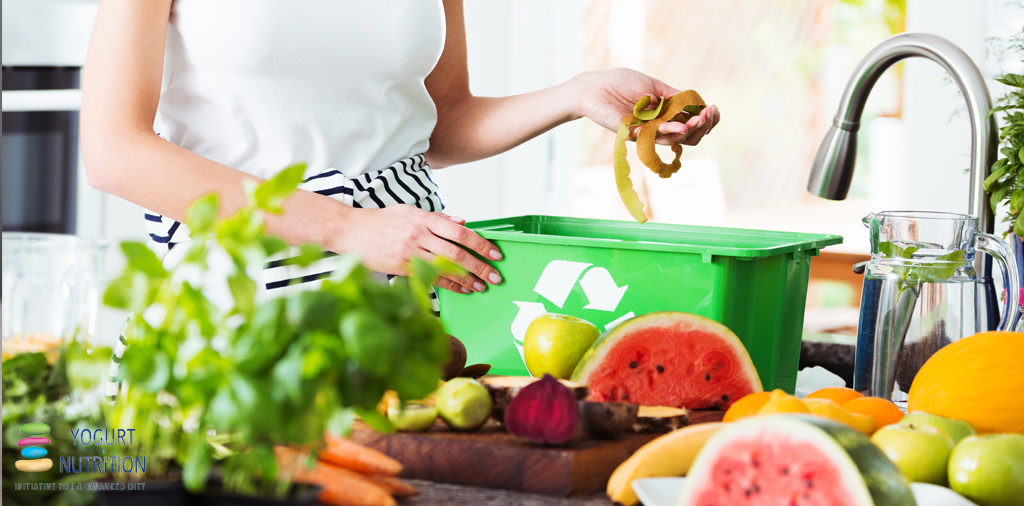At the Yogurt In Nutrition Initiative, we look forward to a more sustainable 2020 and bring you 12 food resolutions to protect our health and our planet. This month’s resolution: reduce food loss and waste by becoming a meal planner.

Become a meal planner and buy only what you need!
Did you know that one-third of all food produced currently goes to waste. On a planet where nearly 820 million people are starving, many waste precious edible food.
The EAT-Lancet report recommends cutting food losses in half. This will require major changes in the food systems: storage, transport, processing and packaging (especially in low-income countries); but also, distribution, retail, and even cooking. Informing consumers, food retailers and restaurant owners on how to reduce their food waste (especially in higher-income countries) is also an important step in our food waste reduction. In addition to dietary changes, reduction in food loss and waste could further slow down food environmental impact, FAO & WHO say.
According to some reports, improving diets and decreasing food waste are essential steps in order to reduce emissions, and provide global food security in 2050. The journey our food takes to reach our dinner plate uses energy. Even disposal of waste food takes up energy and w can no longer allow that loss of food and energy.
When it comes to retail and consumer, food waste is very costly. The majority of losses are related to meat, poulty and fish (41%), vegetables (17%) and dairy products (14%). Many liquid items (milk, yogurt) are disposed of in the sink, so their loss is difficult to determine.
Changing our consumption habits is a major priority to reduce food loss:
- Try to plan your meals each week. Always make a shopping list and a weekly menu.
- Make sure that all the product you buy will be consumed. In other words, shop only what you need!
- Organize your food and meal according to the “FIFO” method: “First In, First Out”.
- Store your food correctly. Store bananas, apples and tomatoes apart, since they can make other perishables spoiled.
- Batch cooking can be a useful strategy to diminish your household food waste: it consists of preparing several meals (for an entire week for example) at a same time. You re-use the same ingredients in different recipes and you don’t waste the end of your cream bottle or the last eggs. It saves you time and money and reduces food waste.
- Other habits like buying in bulk or using dedicated apps to have access to restaurants leftovers are good habits to adopt.
In contrast, some habits should be modified. For example, don’t throw automatically out-of-date products. Some foods can be consumed without any risk after the expiration date. For instance, eating plain yogurt three weeks after its expiration does not expose you to any risk.
Try to get organized, plan your meals and shop consciously!
For more information, check out our Q&A about sustainable diets:
- What is a sustainable diet and why do we need it?
- What needs to change in food production to help us achieve a sustainable diet?
Sources:
-
Willett W, Rockström J, Loken B, et al. Food in the Anthropocene: the EAT–Lancet Commission on healthy diets from sustainable food systems. Lancet. 2019;393(10170):447-492.
-
FAO & WHO. Sustainable healthy diets guidelines principles. 2019.
-
Global Nutrition report. 2018.
-
FAO (2011). Global food losses and food waste – Extent, causes and prevention.
-
Bajželj, B., et al. 2014. Importance of food-demand management for climate mitigation. Nature Climate Change, 4: 924–929.
-
Food and Agriculture Organization, 2011.
-
Vilariño, Franco and Quarrington. Food loss and Waste Reduction as an Integral Part of a Circular Economy. Frontiers in Nutrition. 2017.
-
Von Massow, et al. Valuing the Multiple Impacts of Household Food Waste. Frontiers in Nutrition. 2019.



